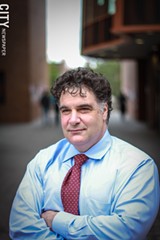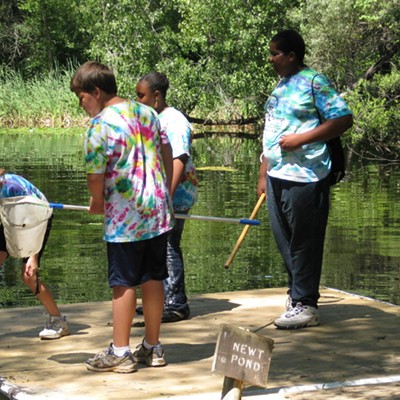[
{
"name": "500x250 Ad",
"insertPoint": "5",
"component": "15667920",
"parentWrapperClass": "",
"requiredCountToDisplay": "1"
}
]
Shortly after the 2016 election, a group unhappy with the presidential election results used Facebook to promote a "Not My America" protest on the University of Rochester campus. That led Ted Pawlicki, a UR professor, to post a derisive comment: he'd pay for the protesters' bus fare to Canada as long as they promised not to return.
The comment lit up social media and put a national spotlight on the UR. Pawlicki continued to teach at the UR, but he apologized and resigned as director of the university's undergraduate computer-science program within days of posting his comment.
It was reported at the time that Pawlicki said he made the comment as "a joke." But judging from remarks on social media and elsewhere, many people thought his post was offensive.
Controversial incidents involving speech aren't new, nor are they limited to the UR, locally. In 2015, Colgate Rochester Crozer Divinity School rescinded a speaking invitation to the Rev. Graylan Hagler, a vocal advocate of Palestinian rights. Hagler was receiving death threats, and CRCDS officials said they didn't have the resources to provide security for the event. Nonetheless, the incident put the school in a difficult situation.
Freedom of speech has become a contentious issue on college campuses across the country, says Joseph Fornieri, political science professor at Rochester Institute of Technology and director of the university's Center for Statesmanship, Law, and Liberty. The Center is holding a symposium this week that focuses on freedom of speech on college campuses.
Fornieri, whose own political views lean to the left, says the Center chose the topic partly because of its timeliness. But he also wants RIT to lead in this discussion rather than be the scene of an incident, he says.
Nadine Strossen, former president of the American Civil Liberties Union and a professor at New York Law School, will give a lecture on Tuesday, April 4. And Alan Kors, history professor at the University of Pennsylvania, will speak on Wednesday, April 5. Both lectures are at 7 p.m. and are free and open to the public.
Fornieri is among a number of academics who are deeply concerned that college campuses are becoming so intolerant of free speech that their core mission – being marketplaces of ideas – is getting lost. A major criticism of higher education, in addition to its rising cost, is that most institutions and their faculties are essentially provinces of the liberal elite. And they're fostering a kind of bubble of infantilized culture, critics say. A heightened intolerance of conservative views, a tendency to label all offensive speech as "hate" speech, is fueling that perception, Fornieri says.
He cites the recent protests at the University of California, Berkeley, and Middlebury College, two institutions that are widely viewed as among the country's most liberal. At the latter, social scientist Charles Murray, author of "Coming Apart: The State of White America, 1960-2010" and co-author of an earlier controversial look at society called "The Bell Curve," was confronted by a hostile mob as he was leaving a debate. Murray's fellow panelist, Allison Stanger, a liberal Middlebury political science professor, ended up in a neck brace after being grabbed by someone at the event.
Stanger later wrote a stinging rebuke of Middlebury students' violent response to what was nothing more than a panel discussion. A staunch liberal, Stanger wrote in the New York Times that she ended up with a concussion "for having the audacity to engage" with a conservative scholar.
RIT was faced with a similar problem when George Tenet, the former director of the Central Intelligence Agency, was asked to speak at a graduation ceremony about 10 years ago, says Fornieri. While some students and faculty members – opposed to the US invasion of Iraq – weren't happy with the decision to invite Tenet, former RIT President Al Simone didn't rescind the invitation.
"I think Simone handled it perfectly," Fornieri says. "He provided an opportunity for expressing dissent without disrupting the ceremony."
RIT, like many schools, has a wide range of student groups and organizations, says Fornieri.
"You have Democrats, libertarians, Republicans – really, we have everyone from socialists to fans of Ayn Rand," he says. But that's not really the issue. What's important is whether individuals with different views are able to engage one another in civil conversations, he says.
"It's not an echo chamber," he says. "You don't want one person to control the debate."
The sentiments of UR sophomore Chris Hodgman, a member of the university's College Republicans group, may typify those of conservative students at many colleges. "The student body is very liberal, and so is most of the faculty," Hodgman says. Though he says doesn't feel restricted in what he says on campus, he also says: "I don't really talk too much about politics. I know I would mostly be in the minority."
"I don't worry about people knowing my views," says Hodgman, who says he was once called a Nazi after sharing some of his libertarian views. "I worry about people misrepresenting my views."
The climate on college campuses concerning free speech isn't just worrisome, says RIT's guest lecturer Nadine Strossen; it's putting the bedrock of a free society at risk. The liberal constitutional law scholar has written two provocative books: "Defending Pornography: Free Speech, Sex, and the Fight for Women's Rights" and "Speaking of Race, Speaking of Sex: Hate Speech, Civil Rights, and Civil Liberties."
Strossen says she is particularly concerned with how the Title IX federal law is being misinterpreted by college administrators. The law basically says that in any education program receiving federal funds, no one can be discriminated against based on gender. While the law's intent is good, it's also having a chilling effect on free speech, she said in a recent telephone interview.
For instance, if a male professor says to a female student, sleep with me or you're not going to receive a good grade, that's an example of sexual harassment. But the law is being construed in some campus policies to mean "any action that makes anyone feel uncomfortable," Strossen said, which could be almost anything. This is causing many professors to self-censor what they say and write out of fear of being fired, she said.
"Current campus policies are analogous to those old anti-porn laws, because they violate free speech and other fundamental rights," Strossen said. The irony is that this doesn't strengthen women's rights, she said; it undermines them.
Academics haven't done a good job of explaining the importance of freedom of speech, Strossen said, and they're partly to blame for what some critics on the right describe as the creation of the "snowflake" culture. She agrees that she, like many people, finds racist, sexist, and homophobic speech horrid. But she draws a line when individuals look to government to repress offensive speech.
"There is a false assumption that if you suppress offensive speech it makes us safer," Strossen said. "But more harm is done than good by censorship."
Latest in News
More by Tim Louis Macaluso
-

RCSD financial crisis builds
Sep 23, 2019 -

RCSD facing spending concerns
Sep 20, 2019 -

Education forum tomorrow night for downtown residents
Sep 17, 2019 - More »






